Green Boom Spreads Into Taiwan's Auto Parts Industry
2009/04/20 | By Steve ChuangThe auto market has been among the worst hit by the global recession, and the pain has been spreading out to OEM auto parts makers in Taiwan. Many in the industry say things have never been worse. But some are looking through of the gloom in search of a "Blue Ocean" strategy to help them weather the storm. One promising area is fuel-efficiency auto parts.
For the U.S. Big Three automakers-GE, Ford and Chrysler, things have been particularly tough this time around. Their car sales in February plunged to 126,170, 96,044 and 84,050 units, respectively, representing reductions of 53.1%, 48.2% and 44% over the same month last year.
Facing the worst sales performance in the past 42 years, the Big Three recently decided to cut output in the second quarter of this year. GM will reduce output by 34% and Ford by 40%. Though the cuts will hit original equipment (OE) parts makers hardest, aftermarket (AM) part suppliers in Taiwan will still be hurt by falling demand as unemployment rises in its biggest market, the U.S. Japanese carmakers, including Toyota, Honda and Nissan, have also seen sales fall off a cliff over the past few months.
Taiwan's auto parts exports eked out a 3.18% gain to NT$152.6 billion (US$4.36 billion at US$1:NT$35) in 2008, with the U.S. absorbing over 30% of the total. But signs of slowing began to appear late in the year. Exports fell 26.7% to NT$9.78 billion (US$279 million) in December as the industry slump intensified. The outlook for the first half of 2009 could be even worse.
Energy efficient auto parts are the one bright spot in the otherwise gloomy picture for the industry. Though the recession and falling oil prices have dampened enthusiasm for developing fuel-efficient technologies and green vehicles, some Taiwanese auto parts makers are still pinning high hopes on earning some green by going green.
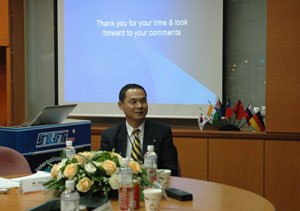
One of the local companies following this route is Just Auto Accessories Co., Ltd., which has earned a name globally for its functional, energy-efficient auxiliary LED (light emitting diode) auto lamps.
Founded in 1982 in Taipei County, northern Taiwan, Just Auto is a seasoned, professional maker of auto accessories, auxiliary LED auto lamps and fine-tuning parts. The firm has an R&D and operation office in Taiwan and two production facilities in mainland China, with a total cross-strait employment of over 300 workers.
Backed by sound production capacity and R&D capability, the ISO9001:2000 and TS16949 certified company provides a full line of products. The company distributes its products worldwide through large international wholesalers and chain stores, including Wal-Mart, Auto Zone, Key Stoner in the U.S., DMV, Auto Style & Auto Parts in Europe, and Autobacs, Yellow Hat, Richard House in Japan and Taiwan. Toyota, Honda, GM and Ford also use auto accessories and parts made by Just Auto.
With eco-friendly products gaining popularity worldwide, Just Auto is riding the green wave to higher profits. Company president Macro Lin says that Just Auto began developing LED products 16 years ago, predicting that the longer lifespan and better luminous efficiency of LED lamps compared to traditional tungsten filament bulbs would make LED lamps a hit. Drawing on its long experience in the sector, the company won the 10th Small and Medium Enterprise Innovation Research Award in 2003 and has been honing its leading position in Taiwan's auto LED sector.


Another E11-approved LED application launched by Just Auto is the LED Side Marker Lamp for trucks. This lamp is innovatively designed with a downward light to illuminate the ground to help drivers maintain proper position when trailing other cars. The downward lighting design, with six white or yellow LEDs, is patent protected in Japan, Taiwan, China, Germany and the U.S. "In Japan, sideward lights are required on trucks and LED lamps are often used for this purpose," Lin said. "Our lamps are more safety-oriented and functional than competing products."
Just Auto joined a multi-company project to design daytime lights and interior lights for Taiwan's first domestically developed fully battery-powered bus, which is scheduled to be debuted this year. "The bus will rely entirely on lithium battery power and LED lighting are well suited for reducing power drain."
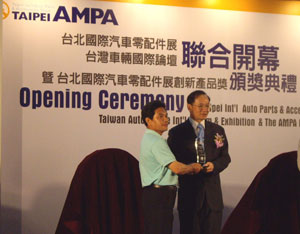
Recession aside, few in the auto industry can deny the importance of developing hybrid and electric vehicles and related parts and components. Some, like YT Stable Tech Corp., have actively embraced this area and are beginning to reap results.
YT Stable, founded in 2005 in Changhua County, central Taiwan, has been making innovative auto brake systems for over a decade. Among its pioneering creations is the world's first Vacuum Brake's Safety (VBS) system. The system has won several awards for functionality and innovation since its debut in 2008, including the Scientific and Educational Corporation Award, AMPA Innovation Award, and Taipei International Invention Show & Technomart (Silver Prize).
With traditional vacuum braking systems, the vacuum system cannot operate normally during engine failure. The VBS system overcomes this shortcoming with a built-in electronic vacuum pump to complement the traditional engine vacuum pump.
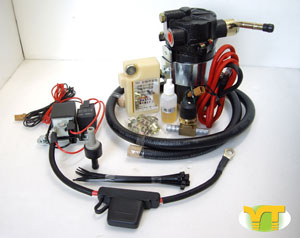
The VBS system has passed a series of situational tests by Taiwan's Automotive Research & Testing Center (ARTC), effectively solving the aforementioned problems by pumping extra pressure to keep brakes at 100% braking efficiency, according to Bernice Wu, sales executive of the company. "ARTC has confirmed that a VBS system-installed car can completely stop within 18.61 meters on average from a 60km/hr speed with its engine stalls, whereas regular breaking systems require a far longer distance of 198.19 meters to stop," Wu says.
The VBS system also can improve engine fuel efficiency by 10% or more and enhance horsepower by increasing the vacuum infusion in an engine's inlet manifolds to achieve an optimal air-fuel ratio. "The system can be installed on any kind of vehicle, especially electric cars, because they are engine-less." Wu says, "YT Stable has already fine-tuned the VBS system to fit electric and hybrid cars, assuring better safety for drivers of these types of car."
Lead-acid Battery Renew Technology
Another local company answering the call to environmental responsibility is Clean & Green Technology Co., Ltd., which is developing eco-friendly technologies and applications for auto and motor batteries.
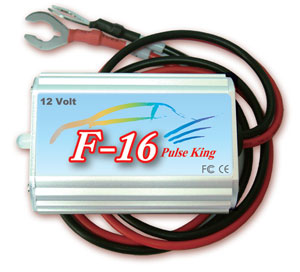
Clean & Green president Tony Wu says that his company's patented F16 Pulse King series of battery revivers is based on pulse technology, which has been applied by the U.S. army since 1995. The device creates micro-electric waves through different frequencies to vibrate and clean crystalline lead sulfide forming during the power generation process in lead-acid batteries to improve battery efficiency.
SGS has also confirmed that the innovative product can boost engine horsepower by 20% and battery lifespan by three-fold. It can also trim fuel consumption by 5% to 15% and cut carbon dioxide emissions in half. Wu says that the F16 Pulse King was honored with the Best New Interior Accessory Product Award at the SEMA (Specialty Equipment Manufacturers Association) Show in the U.S. in 2008.
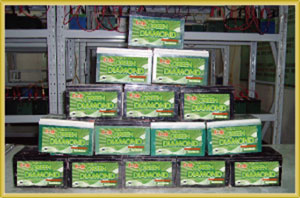
The Lead-acid Battery Renew Technology requires a series of independently developed devices, including digital battery analyzers, micro-computing battery restorers, micro-computing battery restorer connectors for PCs, battery set matchers, Numen Water battery renew solution, two-way high frequency Pulse King revivers, battery start testers and acid leak protectors, and related PC software.
Wu noted that his company buys a great deal of disposed batteries for up to NT$150 (US$4.29) per unit, uses battery analyzers to identify recyclable ones. It then renews those batteries with the micro-computing battery restorers. "With one restorer to handle up to 24 auto batteries once, the renewing process takes 70-80 hours, and can be completely controlled by computer software," he stated. "The software is developed in accordance with real-world experience and effectively helps to determine how long the process continues for different batteries." At the final stage, the company accurately matches different batteries in sets and carefully pours the special solution into those to finish the battery renewal process.
"Using this technology we can restore batteries to 80 to 90% of their original efficiency," Wu said. "Also, the methodology can effectively help to recycle lead-acid batteries and sharply reduce related waste disposal and natural resource consumption. For consumers, they provide a more economical battery solution." Developed in line with growing awareness of eco-friendly concepts, the technology was a winner of 2009 AutoTronics Innovation Awards in Taiwan. The company is going to open a factory in 2009 to renew batteries for sale under the "Green Diamond" brand. The company will take full responsibility for the quality and safety of the reconditioned batteries.
Wu has also come up with a revolutionary business model: battery leasing services. "We set up a chain store to launch the business in Shanghai, China last October, providing battery maintenance and rental services for electric bicycle riders," Wu said. "As China is the world's largest market for electric bicycles, we are very optimistic about the market prospects of the service there."
In addition, Wu is planning to promote the technology in Taiwan and foreign countries, saying that his company has contacted numerous interested electronics and IT companies in science parks in Taiwan about cooperation. Wu notes that these companies have a big need for economical battery maintenance services for their warehouse systems and vehicles." Wu also has his eyes set on the high potential business for electric and hybrid vehicle batteries.
Top 10 Importers of Taiwan-made Auto Parts in 2008 | |||
Country | Value | Contribution | Year-on-year value growth |
The U.S. | NT$53.052 billion | 34.76% | -4.40% |
Japan | NT$10.88 billion | 7.13% | 42.96% |
China | NT$6.133 billion | 4.02% | -32.59% |
Germany | NT$5.038 billion | 3.30% | 2.22% |
Australia | NT$4.466 billion (US$127 million) | 2.93% | -4.42% |
Italy | NT$4.14 billion | 2.71% | 10.60% |
The U.K. | NT$3.883 billion | 2.54% | -1.49% |
Canada | NT$3.759 billion | 2.46% | -1.70% |
Mexico | NT$3.078 billion | 2.02% | 6.22% |
Thailand | NT$3.021 billion | 1.98% | 13.11% |
Total | NT$152.6 billion | 100% | 3.18% |
Source: Taiwan Transportation Vehicle Manufacturers Association | |||




